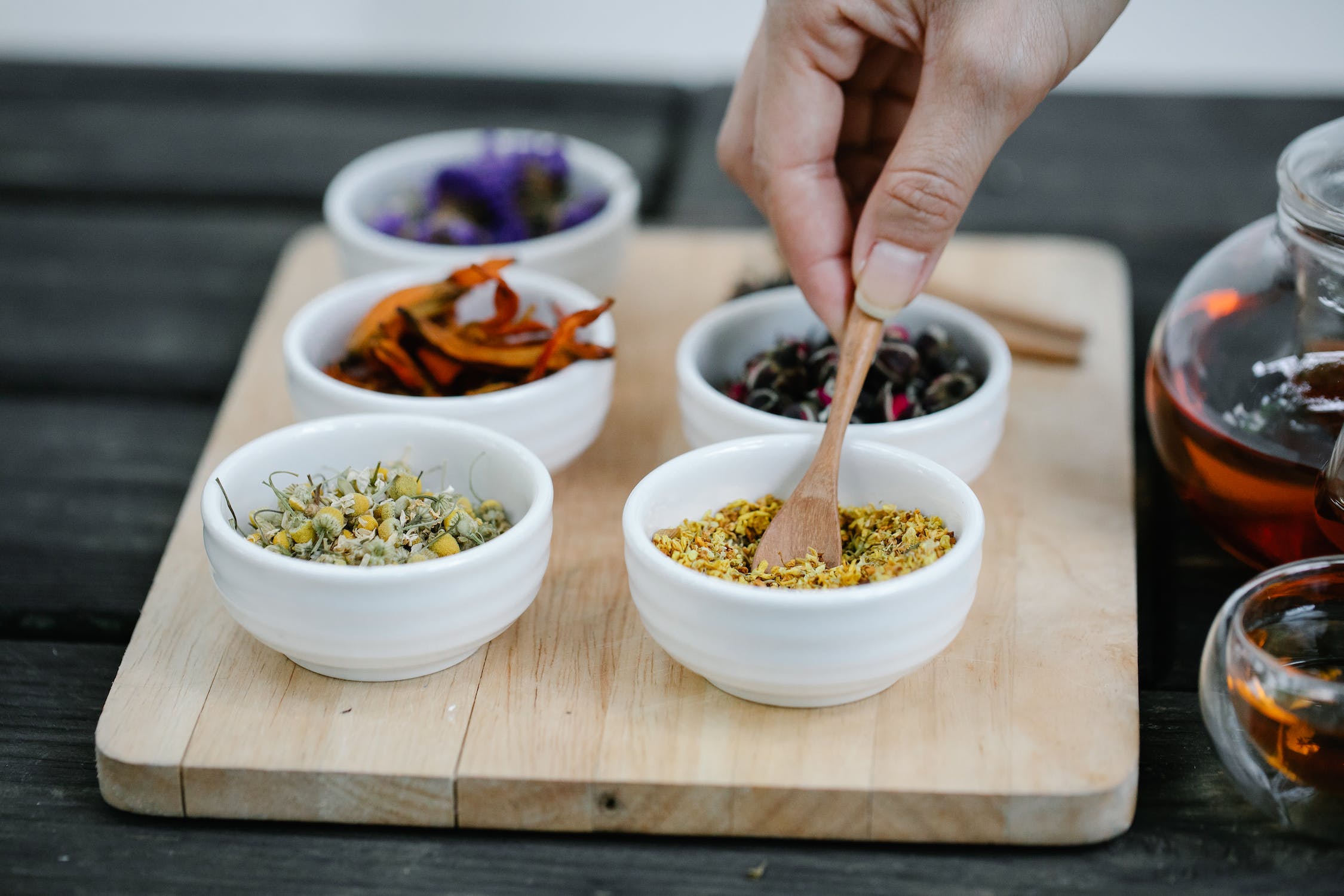In today’s fast-paced world, stress and sleep disturbances are common challenges. The interconnected nature of these two issues often results in a vicious cycle—stress impairs our sleep, and poor sleep, in turn, elevates our stress levels. Thankfully, nature offers an array of potential solutions, one of them being adaptogenic herbs.
Adaptogens are a unique class of healing plants that enhance the body’s natural ability to resist and reduce stress, whether physical, chemical, or biological. The term ‘adaptogen’ comes from their ability to ‘adapt’ their function according to the body’s specific needs, bringing it back to equilibrium. They improve the health of the adrenal system, which manages the body’s hormonal response to stress and fatigue.
Although used for thousands of years in traditional Chinese and Ayurvedic medicine, adaptogens have recently gained popularity in Western health practices for their promising effects on stress reduction and sleep improvement.
In this article, we will explore the top five adaptogenic herbs renowned for their stress-relieving properties and beneficial effects on sleep. These include Ashwagandha, Rhodiola Rosea, Holy Basil (Tulsi), Reishi Mushroom and Siberian Ginseng (Eleuthero).
As we delve into each of these powerful plants, we’ll understand their historical usage, how they help relieve stress, their impact on sleep quality, the recommended dosage and potential side effects. Let’s begin this journey towards natural stress relief and better sleep.
Understanding Stress and Its Impact on Sleep

Stress is a natural response of our body to challenges or demands, a burst of energy that advises on what to do. In moderation, stress can be beneficial – it can help you overcome a challenge or meet a tight deadline. However, chronic stress, characterized by prolonged periods of feeling overwhelmed or under intense pressure, can wreak havoc on our physical and mental health, particularly our sleep patterns.
Types and Causes Stress can be classified into two types: acute stress, a short-term stress reaction to an immediate threat, often known as the fight-or-flight response, and chronic stress, a long-term state where stressors, either real or perceived, are constantly present. Everyday pressures such as work demands, family problems, or major life changes like divorce or job loss can be potential causes of chronic stress.
Effects of Stress on Physical Health and Sleep Stress can lead to a variety of physical and mental health problems, including anxiety, depression, high blood pressure, heart disease, obesity and weakened immune function. Notably, stress also impacts our sleep health. The fight-or-flight hormones that are released during stressful periods keep the body alert, making it challenging to relax and fall asleep. This can lead to sleep disturbances, including insomnia, restless sleep and nightmares.
Scientific Evidence Linking Stress and Poor Sleep Numerous studies have established a bidirectional link between stress and poor sleep. Chronic stress often leads to sleep deprivation, which, in turn, increases stress levels, resulting in a vicious cycle. According to a report published in the Journal of Sleep Research, people with high-stress levels have a greater risk of developing sleep disorders. Another study in the journal SLEEP found that stress-induced sleep disturbances could increase the risk of developing mental health disorders.
Understanding the relationship between stress and sleep is a critical step towards better managing both. The next section will introduce adaptogenic herbs, nature’s answer to stress and sleep problems.
Introduction to Adaptogenic Herbs

Historically, traditional medicine systems across various cultures have turned to nature’s bounty to address health issues. Among the array of medicinal plants, adaptogenic herbs stand out for their ability to help the body resist physical, chemical and mental stressors.
Historical Use and Study of Adaptogenic Herbs Adaptogenic herbs have been used for centuries in traditional Chinese and Ayurvedic medicine. Ayurveda, for example, has utilized Ashwagandha and Holy Basil (Tulsi) to restore balance and increase resilience to stress. Traditional Chinese medicine has similarly recognized the benefits of Reishi mushrooms and Siberian Ginseng (Eleuthero). Modern science has begun to study these herbs intensively and the results have validated many of the traditional claims about their benefits.
How Adaptogenic Herbs Work in the Body Adaptogens work by supporting the adrenal glands, which control the body’s hormonal responses to stress. They help balance cortisol levels, the primary stress hormone, improve brain function and promote a sense of calm. By doing so, adaptogens help enhance the body’s ability to cope with anxiety and fight fatigue – leading to better sleep.
Benefits of Using Adaptogenic Herbs for Stress Relief and Better Sleep Adaptogenic herbs have a broad range of health benefits. Besides their stress-reducing effects, they help enhance focus and mental stamina, boost immune function and improve mood. Crucially, by helping the body relax and achieve a state of calm, adaptogens can improve sleep quality. Regular use of these herbs can therefore help break the stress-poor sleep cycle and improve overall wellbeing.
Having established what adaptogens are and how they work, let’s dive deeper into five of the most effective adaptogenic herbs for stress relief and better sleep: Ashwagandha, Rhodiola Rosea, Holy Basil (Tulsi), Reishi Mushroom and Siberian Ginseng (Eleuthero).
Top 5 Adaptogenic Herbs for Stress Relief and Better Sleep

Adaptogenic herbs come in a variety of types, each with unique properties. Here, we will delve into five of the most potent adaptogens for stress relief and improved sleep.
Ashwagandha
- Description and history: Ashwagandha, also known as Indian ginseng, is a central herb in Ayurveda, the traditional Indian system of medicine. It is renowned for its restorative and rejuvenating properties.
- How it helps relieve stress: Ashwagandha can reduce cortisol levels, the body’s main stress hormone. It’s known for its potent anti-stress properties, reducing anxiety and promoting a calm state of mind.
- How it can improve sleep: The Latin name for Ashwagandha, Withania somnifera, translates to “sleep-inducing”. It has been used traditionally for promoting sleep and recent studies back this usage.
- Recommended dosage and usage: Ashwagandha is typically consumed as a powder mixed in milk or water, but it is also available in capsule and tincture forms. The dosage may vary, but commonly, a daily intake of 300-500 mg is recommended for general well-being.
- Any potential side effects or contraindications: Though generally safe for most people, it might cause minor side effects like diarrhea and stomach upset in some. Pregnant women, individuals with autoimmune diseases and those on medication for thyroid disease should consult a healthcare provider before use.
Rhodiola Rosea
- Description and history: Rhodiola Rosea, also known as golden root or arctic root, is a plant that grows in the cold, mountainous regions of Europe and Asia. It has been used in traditional medicine in Russia and Scandinavia for centuries to cope with the harsh climates and high altitudes.
- How it helps relieve stress: Rhodiola Rosea helps the body adapt to stress by balancing the body’s stress-response system. It is especially effective for reducing symptoms of burnout, which often results from chronic stress.
- How it can improve sleep: By reducing stress, anxiety, and depressive symptoms, Rhodiola Rosea can indirectly improve sleep. It is not a sedative, but by promoting overall relaxation, it can help restore healthy sleep patterns.
- Recommended dosage and usage: The typical dose ranges from 200-600 mg daily. It is generally recommended to start with a lower dose and increase if necessary. It’s commonly taken in capsule form.
- Any potential side effects or contraindications: Some people may experience side effects such as dry mouth or dizziness. As it can potentially interact with certain medications, individuals on prescription drugs should consult a healthcare provider before use.
Holy Basil (Tulsi)
- Description and history: Also known as Tulsi, Holy Basil is considered a sacred plant in India, widely used in Ayurvedic medicine for over 3,000 years. Revered for its versatile medicinal properties, Holy Basil has been used for everything from common colds to chronic diseases.
- How it helps relieve stress: Holy Basil has natural anti-stress compounds known as adaptogens that maintain balance in the body’s stress-response system. It can help lower cortisol levels and regulate the adrenal glands, easing the physical and mental impacts of stress and anxiety.
- How it can improve sleep: As a natural adaptogen, Holy Basil can regulate cortisol production and balance the body’s circadian rhythm, which is the internal process that regulates the sleep-wake cycle. By reducing stress and anxiety, Holy Basil can calm the mind, making it easier to fall asleep and stay asleep.
- Recommended dosage and usage: Holy Basil can be consumed in various forms, such as fresh leaves, dried powder, or as a supplement. The recommended dosage can vary depending on the form and concentration, but for general wellness, 300-2,000 mg of dried leaf extract or 2-3 cups of Tulsi tea per day is often recommended.
- Any potential side effects or contraindications: While Holy Basil is generally safe for most people, some individuals may experience nausea or diarrhea. Pregnant or breastfeeding women, individuals with diabetes and those scheduled for surgery should consult with a healthcare professional before use as Holy Basil may lower blood sugar levels and slow blood clotting.
Reishi Mushroom
- Description and history: Known as the “Mushroom of Immortality”, the Reishi mushroom is a staple in Eastern medicine. It has been used for more than 2000 years in Traditional Chinese Medicine to promote health, longevity and spiritual insight.
- How it helps relieve stress: Reishi mushrooms are adaptogenic, helping the body manage and resist stress. It has been linked to decreased levels of fatigue and depression and is known for promoting a sense of calm and balance in the body.
- How it can improve sleep: Traditionally, Reishi mushroom has been used to support restful sleep due to its calming properties. By lowering anxiety and promoting a relaxed state of mind, Reishi mushroom can help improve the quality and duration of sleep.
- Recommended dosage and usage: Reishi mushroom can be consumed as a tea, tincture, or in capsule form. A typical dose ranges from 1.5 to 9 grams of mushroom extract daily, but the exact dose may depend on the specific product and individual needs.
- Any potential side effects or contraindications: Although it’s generally safe for most people when used appropriately, some people may experience side effects such as digestive upset, dizziness, rash, or headache. It also has blood-thinning effects, so individuals on anticoagulant medication or who are scheduled for surgery should consult a healthcare provider before use.
Siberian Ginseng (Eleuthero)
- Description and history: Siberian Ginseng, also known as Eleuthero, has been used for thousands of years in Traditional Chinese Medicine and Russia to increase energy, reduce fatigue and enhance overall health. It’s important to note that despite the name, it is not a true ginseng but shares similar properties and uses.
- How it helps relieve stress: Siberian Ginseng is an adaptogen, meaning it helps the body better cope with physical and mental stress. It reduces the stress hormone cortisol, mitigates the negative effects of stress and helps restore balance in the body’s stress response system.
- How it can improve sleep: While not directly a sedative, by reducing anxiety and stress, Siberian Ginseng can promote better quality sleep. It also helps combat fatigue, leading to more restful and rejuvenating sleep.
- Recommended dosage and usage: Siberian Ginseng is often taken in the form of capsules, liquid extract, or tea. The recommended daily dose can vary but typically ranges between 300-1200 mg for the dried root.
- Any potential side effects or contraindications: Siberian Ginseng is generally safe but can cause side effects in some people, such as mild diarrhea, heart palpitations, or changes in blood pressure. It is not recommended for children, pregnant or breastfeeding women and those with autoimmune diseases without consulting a healthcare provider. As with all herbs, it’s important to start with a lower dose to see how your body reacts and consult a healthcare provider if you’re on any medication due to potential interactions.
How to Incorporate Adaptogenic Herbs into Your Daily Routine

Integrating adaptogenic herbs into your routine is an effective way to naturally alleviate stress and improve sleep. Here are some tips on how to include these potent plants in your daily life:
Choosing the Right Adaptogenic Herb Every adaptogenic herb has unique properties and benefits. To find the most suitable one for you, consider the specific health issues you’re facing, such as high levels of stress, trouble sleeping, or both. Some people might find a single adaptogen works well, while others may benefit from a combination.
Different Forms of Adaptogens Adaptogenic herbs are available in various forms, including capsules, tinctures, teas and powders. Choose a format that best fits your lifestyle and personal preferences. For example, if you’re a tea lover, you might enjoy sipping on a warm cup of Tulsi or Reishi mushroom tea.
When to Take Adaptogens Timing depends on the adaptogen and your individual needs. For instance, Ashwagandha is often taken before bed due to its sleep-promoting effects, while Rhodiola Rosea is typically consumed in the morning or early afternoon as it can be energizing. Always follow the manufacturer’s guidelines and consult with a healthcare professional if unsure.
Consistency is Key To get the full benefits of adaptogenic herbs, consistency is vital. These are not quick-fix solutions; they work gradually over time to help your body adapt to stress and improve sleep.
Consultation with a Healthcare Professional Before starting any new supplement regimen, it’s recommended to consult with a healthcare professional, particularly for those with underlying health conditions, those on medications, pregnant women and breastfeeding mothers.
Adaptogenic herbs are a natural and effective way to manage stress and improve sleep. They offer a holistic approach to health, working to bring balance to the body and mind. By incorporating these powerful plants into your routine, you could see a significant improvement in your overall well-being.
Conclusion: Embracing the Power of Adaptogens for Stress Relief and Better Sleep

Stress and sleep issues are interrelated and pervasive problems in today’s fast-paced world. As modern life’s pressures show no sign of abating, it’s crucial to find sustainable, natural strategies to manage stress and improve sleep.
Incorporating adaptogenic herbs into your wellness routine can be an effective strategy for mitigating the impacts of stress and ensuring better sleep quality. By offering a holistic approach to health, adaptogens like Ashwagandha, Rhodiola Rosea, Holy Basil (Tulsi), Reishi Mushroom and Siberian Ginseng (Eleuthero) not only support stress relief and sleep enhancement but also contribute to improved mental clarity, immune function and overall well-being.
However, it’s important to remember that while adaptogens are powerful, they are not a cure-all solution. They should be part of a balanced lifestyle that includes regular exercise, a healthy diet, mindfulness practices and adequate sleep.
Lastly, before starting any new supplement regimen, always consult with a healthcare professional to ensure it’s appropriate for your specific needs and circumstances. Embrace the wisdom of traditional medicine and let the power of nature’s adaptogenic herbs guide you to a life of less stress and better sleep.
Explore the holistic benefits of adaptogens in an easy, enjoyable form with NoNicVapes’ range of adaptogenic herb-infused vape pens, a natural and innovative approach to stress relief and better sleep.
Further Reading
For readers who are interested in diving deeper into the world of adaptogens, stress management, and sleep improvement, here are some highly recommended resources.
- “Adaptogens: Herbs for Strength, Stamina, and Stress Relief” by David Winston and Steven Maimes – This book provides a comprehensive look into adaptogenic herbs, their uses and scientific studies backing their benefits.
- “The Sleep Revolution: Transforming Your Life, One Night at a Time” by Arianna Huffington – A compelling exploration of the critical role sleep plays in our every waking moment and the havoc our disregard for it has caused on our health, our jobs and our lives.
- “Why Zebras Don’t Get Ulcers” by Robert M. Sapolsky – This book offers a detailed examination of the impact of stress on our bodies and minds, providing useful insights on how to manage chronic stress effectively.
- “The Ayurveda Way: 108 Practices from the World’s Oldest Healing System for Better Sleep, Less Stress, Optimal Digestion, and More” by Ananta Ripa Ajmera – An easy-to-follow guide on Ayurvedic principles, including the use of adaptogens, for improved overall health.
- Examine.com’s pages on Ashwagandha, Rhodiola Rosea, Holy Basil, Reishi Mushroom, and Eleuthero (Siberian Ginseng) – These pages offer in-depth, research-backed information on these specific adaptogens.
- National Center for Complementary and Integrative Health (NCCIH) – A reliable resource for information on complementary and integrative health, including herbs and botanicals like adaptogens.
Remember, understanding is the first step to well-informed decisions about your health and well-being. These resources should give you a comprehensive look at the power of adaptogens and their potential benefits for stress relief and better sleep.

